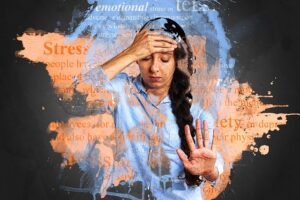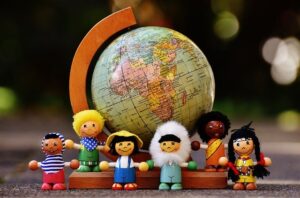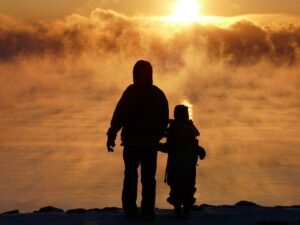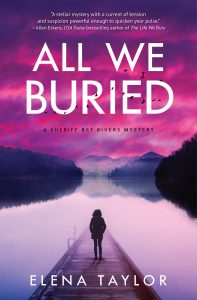Thoughts on “New Normal”
New Normal is an expression getting bandied about quite a bit these days, and it always sets my teeth on edge. Language is a powerful force and how we use it changes our perceptions of the world we live in. I’m not an epidemiologist nor a economist nor a sociologist, but I am a wordologist, so let’s all take a breath before we accept that statement as accurate for our situation.
Wondering about some writerly ways to get through the pandemic? Read my post on #WeWriteThrough by clicking the link here.
Here are five reasons I think everyone needs to stop using the term “New Normal” as it relates to our current pandemic and economic state. Feel free to take them with a grain of salt, but just take them . . .
1. Pandemics End: It’s not a new normal if it ends.

I know it doesn’t feel like it.
I’ve been on lockdown since March 15, and there are others for whom the lockdown has been even longer. That’s a long time to live under these conditions.
It’s stressful. We are worried about our families and friends and communities. We have lost people to this disease, and will lose more before it’s over. Businesses are folding and people are losing their jobs.
But none of that makes this situation permanent on a global scale.
The H1N1 pandemic of 1918 lasted not quite two years. 500 million people were infected and 50 million died. It mostly ended through social distancing (quarantine) and hand washing. It did not become the new normal.
The Black Death, or Bubonic Plague of 1347-1353 killed an estimated 75-200 million people in Europe. It probably ended through social distancing. People stayed home until the virus died out. It did not become the new normal.
The Rona is not permanent.
To put the current pandemic into a visual perspective, click the link here.
2. Your New Normal Isn’t Everyone Else’s New Normal.

We may be “in this together” but we are not experiencing the same thing. To state that this is the “new normal” makes everyone’s experience identical, and that’s simply not true.
Some of us work from home, don’t have children in school, and are able to socially isolate with minimal interference to our daily lives.
For others, their entire job sector has virtually disappeared overnight, with minimal success to move things online.
Some of us don’t know a single person who has come down with COVID-19, and others have lost entire families to the disease.
The situation is not impacting every socio-economic, ethnic, or racial group the same. So, which “normal” are we proposing with this statement?
To learn a little about what the Native American community is dealing with in the United States, click the link here.
Normal is a subjective word but it’s being used objectively.
Merriam-Webster defines normal as: conforming to a type, standard, or regular pattern.
We cannot at this point, discuss anything about the pandemic as fitting this definition.
If everyone’s “new normal” is different, then how can we talk about the current situation as being objectively conforming to a type or standard?
If you want a little comparison, take a look at how Sweden approached the pandemic. How does your “normal” compare to the people living there?
3. New Normal accepts the increase in domestic violence, suicide, and drug and alcohol addiction as permanent.
There has been a spike in domestic violence, suicide, and addictive behaviors. Vulnerable people are more impacted by isolation. To call our current situation the new normal takes their temporary isolation and makes it “how things are”. In my opinion, this minimizes an individual’s autonomy to seek out help.
It also supports the premise this is how things will continue to be, rather than showing those who are suffering that there is hope. That we will return to a non-pandemic society or that help is out there now, even before the pandemic ends.
Rather than using the term new normal, let’s keep things framed around the pandemic situation and seek answers for the most vulnerable in our communities who suffer most.
These are all US resources, but a quick Google search will help you find assistance anywhere in the world.
Suicide Hotline
Domestic Abuse Hotline
Drug and Alcohol Addiction Hotline
4. Things are Changing Rapidly in our Understanding of the Coronavirus and COVID-19

What we knew in March is not what we know now. If we define normal as standard or a regular pattern, that’s not how things are currently functioning. There is no uniform response to the pandemic, by country or state or county.
Scientists are working around the clock to advance a vaccine or a cure. Both appear to be possible within the next 12-18 months (and I’m being cautious with my estimate, it could happen sooner).
With the potential for a cure or vaccine available before the end of 2021, then things will once again, change very rapidly. We will return to public events and gatherings. Travel will recommence. The economy will recover. Even if it doesn’t look the same as it did pre-pandemic, it will not remain as it is today.
5. This recession is unlikely to rebound in the same way previous recessions have rebounded in recent years.

This brings me to my last point. Yes, people have suffered and will continue to suffer, but this is not the Great Depression, which started in the United States in 1929 and lasted the better part of a decade. There are similarities, with devastating unemployment and terrifying personal economic realities. But the causes and recovery are unique in this situation.
Economists recognize businesses will reopen. New businesses will arrive to replace those that have failed. Other businesses are surviving online and remotely, protecting assets and employees, and will continue to modify their business models as the pandemic ends.
But even if this was the second Great Depression, remember that that too, ended. It did not become the new normal. It did force economic and business changes and illuminated the very real dangers of human impact on the environment, but it did not remain a permanent situation.
Yes, we need to deal with climate change, but that would be true regardless of the pandemic. They are related, but separate issues.
We are in a challenging and difficult time. But this is not our permanent experience.
It may be that business travel never returns in full force. People may choose to work remotely from now on, and companies may do what they can to facilitate their employees working from home, saving on office space, travel, and other costs.
But those aren’t bad things. They are part of the evolution of a society.
None of us can say for certain how long the pandemic and its repercussions will last, and what impacts will be permanent, but one thing is true. Human beings are resilient. We can get through this. As a group. As a whole. Especially if we protect the most vulnerable among us and think of everyone on the street as worthy of our respect and support.
My final thoughts on the concept of New Normal

As a writer, I feel that identifying our current situation as a permanent one does a disservice to our communities. It removes hope for those who are despondent. It promotes the idea that bad situations are permanently part of who we are. That would be an excuse not to look for answers. Further, it encourages people to stop trying to survive a short term event, when that is what we may need to focus on most.
In the short term, we can wear our masks, social distance, wash our hands, and stay home if we’re sick.
We can come together to make a brighter future.
As for the long term, we aren’t there yet, so let’s stop talking as if we are.
 Elena Taylor is the author of All We Buried, available now in print, e-book, and audio book format at all your favorite on-line retailers. And don’t forget many independent bookstores can order books for you and have them shipped to your home or for curbside pickup.
Elena Taylor is the author of All We Buried, available now in print, e-book, and audio book format at all your favorite on-line retailers. And don’t forget many independent bookstores can order books for you and have them shipped to your home or for curbside pickup.
For more information on All We Buried, click on the link here to visit the home page.
Stress Photo by The Digital Artist on Pixabay.
Globe/doll photo by Alexas_Fotos on Pixabay.
Scientist image by Gerd Altmann on Pixabay.
Abandoned shed by Siggy Nowak on Pixabay.
Bright future photo by wondermar on Pixabay.



This is an excellent article!Thank you for sharing your expertise as a wordologist to inspire us all and keep us focused on a future trajectory with the circumstances of others in mind. I would add “wear a mask” to your other recommendations at the end of the article.
I totally thought I had written that! This is why we need editors. I’ve added it to the recommendations.
Very eloquent. Thank you.
Thanks, Bill. I appreciate your kind words.
Hello!
I’d like to talk to someone about the resources listed on your website.
Thanks so much!